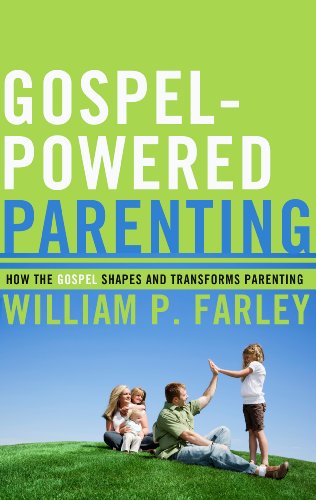
Quotes by William Farley
Effective parents equip their children to overcome the world – not by changing and controlling their environment (things external to their children), but by going after their children’s hearts. We change their hearts by teaching the gospel, modeling the gospel, and centering our homes on the gospel. The gospel, rightly understood and modeled, makes Christianity attractive. Effective parents make the gospel so attractive that the world cannot get a foothold in their children’s hearts.
Gospel-Powered Parenting, 2009, P&R Publishing, p. 24, Used by Permission. Get this book!
Parental affection is very powerful. It makes the parent, and the parent’s God, attractive. It communicates love and acceptance. We might tell our children that we love them, but affection convinces them. It is the bridge over which love passes to our children. Affection is the hammer that drives the nail of truth deep into their hearts. It would be hard to overstate the importance of affection.
Gospel-Powered Parenting, 2009, P&R Publishing, p. 205, Used by Permission. Get this book!
The default condition of our flesh is “earn it.” We enter the world in love with legalism. We are convinced that we can merit God’s favor. We love moralism, but we resist the gospel. Parents who understand this never cease preaching the gospel to themselves and their children.
Gospel-Powered Parenting, 2009, P&R Publishing, p. 184, Used by Permission. Get this book!
Eighty eight percent of the teens in evangelical churches will walk away from Christianity. Some seventy percent of those in church youth groups (teen Sunday school) will do the same. Parental abdication is not working. God is not blessing it.
Gospel-Powered Parenting, 2009, P&R Publishing, p. 180, Used by Permission. Get this book!
The fear of God equips parents to overcome the fear of their children. They can disappoint their children, but they dare not disappoint God. Why? They believe that God is sovereign over their children’s hearts. God holds all the strings. He is in control. Those who really believe this are free to be God pleasers rather than child fearers. Parents lacking this confidence will often be slaves to their children’s approval. Parents who fear God have only one audience: God. If they please Him, they are confident that He will produce the results they seek in their children.
Gospel-Powered Parenting, 2009, P&R Publishing, p. 172-173, Used by Permission. Get this book!
Gospel-centered parents use discipline to help their children see sin through God’s eyes, to help them see that heart-sins are the real issue, that sin has consequences, that God forgives us on the basis of His Son’s cross, not our performance, and that God disciplines us because He loves us.
Gospel-Powered Parenting, 2009, P&R Publishing, p. 166, Used by Permission. Get this book!
Pride is blindness to our faults, sins, and failings. Most importantly, pride is blind to the existence of itself. Therefore, the more proud you are, the more humble you will feel, and the more humble you are, the more proud you will feel. That is because true humility is the opening of the eyes to our personal sin, and one of the first things a humble person becomes aware of is his or her pride.
Gospel-Powered Parenting, 2009, P&R Publishing, p. 115, Used by Permission. Get this book!
The cross confirms all that we have said about the infinite offense of sin. It says that no finite sacrifice can atone for sin (Heb. 10:4). Nothing but a sacrifice of infinite value, God Himself, can atone for our offenses. In addition, no one but an infinite Being is capable of suffering sufficiently to atone for infinite offenses against an infinitely holy God.
Gospel-Powered Parenting, 2009, P&R Publishing, p. 94, Used by Permission. Get this book!
There is a fine line between healthy parental love and child worship. We know the latter has happened when we begin compromising God’s will for the sake of our children or their activities… Compromise always points to idolatry. It displeases God. He does not like competitors, especially when they are our children.
Gospel-Powered Parenting, 2009, P&R Publishing, p. 33, Used by Permission. Get this book!
Fathers, discuss what you read in your morning devotions. It takes no preparation, and is conducive to spontaneous discussion. If you missed morning devotions, discuss the Sunday sermon, or read through a book of the Bible together. The possibilities are endless. The point is this: You don’t need to be a Bible scholar or a schoolteacher to teach your children. What you need is diligence, consistency, perseverance, and confidence that repeated exposure to the gospel will ultimately change your children’s lives.
Gospel-Powered Parenting, 2009, P&R Publishing, p. 191, Used by Permission. Get this book!
Ultimately, men learn masculinity from God. God is not male. He does not have a body. But God is pure, unadulterated masculinity. Ultimately, He alone is the Christian father’s role model. His masculinity expresses itself as the willingness to initiate…the willingness to initiate is the heart and soul of God’s masculinity. God serves us by initiating. He initiated creation. He initiated our redemption. He came to us in the incarnation. We didn’t go to Him. This willingness is most likely what God means when He refers to Himself with masculine pronouns. Although God does not have a male body, He is the ultimate initiator. He is the ultimate servant-leader. In this sense, God the Father is absolute masculinity.
Gospel-Powered Parenting, 2009, P&R Publishing, p. 137-138, Used by Permission. Get this book!
The more holy someone or something is, the more separate he or it is from things that are common or normal. The opposite of holiness is not sinfulness. It is commonness – or, to use the old word, profaneness. When God says He is holy, He means that He is different from us. He means that He constantly and actively separates Himself from all sin, wickedness, evil, and moral corruption – that is, all that is common to this world.
Gospel-Powered Parenting, 2009, P&R Publishing, p. 72, Used by Permission. Get this book!
Slave-dread, the wrong type of fear, does not motivate obedience. It causes us to run away from God… Those with slave-dread fear draw back from God. They have no conviction that He is good, that He rewards those who seek Him, or that He has their best interests at heart. All they see is His holiness, His severity, and His hatred of sin, and they run the other way. By contrast son-fear motivates us to pursue God… Those who fear Him as sons obey God and keep His commandments.
Gospel-Powered Parenting, 2009, P&R Publishing, p. 63, Used by Permission. Get this book!
New birth…means one has enthroned Christ in the center of one’s life. You become a Christian when your life, thinking and behavior begin to revolve around Jesus Christ. Until that happens, professions and decisions mean very little. Changed behavior processing from a spiritual heart transplant is the only certain evidence of new birth.
Gospel-Powered Parenting, 2009, P&R Publishing, p. 30, Used by Permission. Get this book!
Moralism – the idea that we merit God’s favor by being good – is the deadly enemy of [the] Christian… Moralism trusts in its own goodness, virtue, and principled intentions to get a “not guilty” verdict from God on the Day of Judgment. It is deceptive. A cloak of morality over an unregenerate heart can make it difficult to discern [one’s] true spiritual condition.
Gospel-Powered Parenting, 2009, P&R Publishing, p. 42, Used by Permission. Get this book!
In my experience, the most effective parents have a clear grasp of the cross and its implications for daily life. The implications are manifold. They include the fear of God, a marriage that preaches the gospel to its children, deeply ingrained humility, gratitude, joy, firmness coupled with affection, and consistent teaching modeled by parents daily.
Gospel-Powered Parenting, 2009, P&R Publishing, p. 15, Used by Permission. Get this book!
The common denominator between success and failure seems to be the spiritual depth and sincerity of the parents, especially the spiritual depth and sincerity of the father. There seems to be a strong correlation between the faith, commitment, and sincerity of the family’s head and the spiritual vitality of His adult children.
Gospel-Powered Parenting, 2009, P&R Publishing, p. 15, Used by Permission. Get this book!
There must be a breaking of the child’s self-will. When that occurs, the child will no longer be angry with you, has taken responsibility for his or her action, has sincerely confessed the wrongdoing, and is repentant.
Gospel-Powered Parenting, 2009, P&R Publishing, p. 168, Used by Permission. Get this book!
New birth is known by its fruits, not by a decision. The most important fruit is hunger for God Himself. Effective parents assume this, and patiently wait for sustained fruit before they render a verdict.
Gospel-Powered Parenting, 2009, P&R Publishing, p. 30, Used by Permission. Get this book!
Without the black backdrop of our sinful nature and its consequences (God’s wrath), the gospel is a big yawn.
Gospel-Powered Parenting, 2009, P&R Publishing, p. 49, Used by Permission. Get this book!
The Son and the Spirit do not resent submission. Rather, it is their joy. They love to submit. That is because submission to God’s authority is inherently good, virtuous and beautiful. The Father does not feel superior because He exercises authority. He is a servant. He directs the Son with infinite love.
Gospel-Powered Parenting, 2009, P&R Publishing, p. 158, Used by Permission. Get this book!
Just as men become more masculine around men who are humble servant leaders, so they become more masculine in the presence of biblical femininity.
Gospel-Powered Parenting, 2009, P&R Publishing, p. 140, Used by Permission. Get this book!
Jesus Christ modeled biblical masculinity. 1. He initiated our salvation at the cost of His life. 2. He was a servant-leader in the first order. 3. He provides for our daily material needs. 4. He protects His church at the cost of His life. The deeper a man’s relationship with God’s Son, the more potent His masculinity will gradually become.
Summarized from Gospel-Powered Parenting, 2009, P&R Publishing, p. 138, Used by Permission. Get this book!
When women lead, men withdraw from both church and home. But when male servant-leaders abound, young men eagerly volunteer to serve. Vibrant, godly, male leadership attracts men. It encourages their involvement. It motivates them to serve in the church and home. Men are irresistibly attracted to other men who model biblical masculinity.
Gospel-Powered Parenting, 2009, P&R Publishing, p. 126, Used by Permission. Get this book!
The best way to overcome the world is not with morality or self-discipline. Christians overcome the world by seeing the beauty and excellence of Christ. They overcome the world by seeing something more attractive than the world: Christ… [They] conquer the lusts of this world with a higher passion: the moral beauty of Christ… The world’s allurements [can] not compete.
Gospel-Powered Parenting, 2009, P&R Publishing, p. 23, Used by Permission. Get this book!
God is sovereign, but parents are responsible. God’s sovereignty is our hope. Parents are utterly dependent on God. He can save any child, no matter how dark the circumstances. On the other hand, God normally reaches children through their parents. It is fatal to presume on God’s sovereignty by neglecting parental faithfulness. Yet it is also a mistake to assume that it all depends on us. It doesn’t. In fact, none of your efforts will prevail unless God bestows the gift of faith on your children. We are utterly dependent and responsible at the same time.
Gospel-Powered Parenting, 2009, P&R Publishing, p. 22, Used by Permission. Get this book!
Our attempts to live the gospel expose our failings, which in turn amplifies our humility, which in turn makes us attractive to our children. The gospel is the good news that our children do not need perfect examples. They need humble examples.
Gospel-Powered Parenting, 2009, P&R Publishing, p. 119, Used by Permission. Get this book!
Sin destroys everything it touches. It destroys the glory of God. It distorts individual happiness. It corrupts families. It divides churches. It is like rat poison. It smells and looks good, but it ultimately kills its victim. Although sin often brings short-term pleasure, if not atoned for, it terminates in infinite pain.
Gospel-Powered Parenting, 2009, P&R Publishing, p. 79, Used by Permission. Get this book!
For [the common] acronym to work, we must figure the ugliness of sin into the equation. If the definition read, “G.R.A.C.E. is God’s Riches At Christ’s Expense extended to men and women who deserve wrath,” we would have a complete definition of grace.
Gospel-Powered Parenting, 2009, P&R Publishing, p. 88, Used by Permission. Get this book!
[Don’t mistake] God’s patience with sinners for the idea that God is tolerant of sin.
Gospel-Powered Parenting, 2009, P&R Publishing, p. 57, Used by Permission. Get this book!
Holiness is a fundamental attribute. It is the most important thing to know about [God]. It is where we start with God. His holiness defines all His other attributes… Day and night, those closest to Him, the cherubim and seraphim, cry, “Holy, holy, holy is the Lord of hosts” (Isa. 6:3). Everything about God is holy.
Gospel-Powered Parenting, 2009, P&R Publishing, p. 73-74, Used by Permission. Get this book!
Grace is reward, or favor, given to those who deserve judgment. If a judge found a serial rapist guilty, and then stepped down from his bench, agreed to take the death penalty in the criminal’s place, and sent the rapist on an all-expense-paid vacation to Hawaii for thirty years, that would be grace. The severity of the criminal’s crimes would be the measure of the judge’s grace. In the same way, the knowledge of what we deserve, and what it cost God to be gracious, is the measure of His fatherly grace. When it is said and done, the cross is the tape that measures the length and breadth of God’s grace. Like God’s wrath, His grace is holy. It transcends all human conceptions.
Gospel-Powered Parenting, 2009, P&R Publishing, p. 89, Used by Permission. Get this book!
[Steps to the successful discipline of a child:] 1. Consistency. Train your children to respond on the first command. 2. Always put your discipline in the context of love. 3. Reference Scripture. 4. Make sure it hurts. 5. Hold the child until he or she stops crying. 6. Use the discipline event to rehearse the gospel. 7. Ask them to verbally confess the specific sin for which they are being disciplined. 8. Have your child perform restitution.
Summarized from Gospel-Powered Parenting, 2009, P&R Publishing, p. 167-170, Used by Permission. Get this book!



